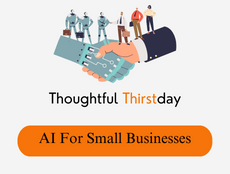Owning a small business can be quite challenging at times. Entrepreneurs often need help dealing with limited resources, tight budgets, and fierce competition, which can be a constant source of frustration.
As a business owner, focusing on making your operations more efficient, drawing in customers, and increasing your profits is essential. Fortunately, there is a ray of hope for small businesses, thanks to technological progress, particularly in Artificial Intelligence (AI).

Artificial intelligence can provide creative solutions that take over repetitive tasks, enhance business owners’ decisions, and offer valuable insights. AI tools for small businesses are also evolving as AI is constantly growing. Businesses can now leverage those AI-powered tools and platforms to streamline their operations, improve customer experiences, and stay ahead of the competition in today’s dynamic business environment.
Embracing AI for small businesses can be a game-changer; it can address business challenges and provide opportunities for growth and success.
Let’s check out how..!!
How Can AI Help Small Businesses And Act As A Success Catalyst?
1. Streamlining Operations with AI Automation
Small businesses must prioritize efficiency and productivity to stay competitive in today’s business world. Artificial intelligence provides an effective solution by automating monotonous tasks, saving precious time and resources. Small businesses can benefit significantly from AI-powered tools and systems.
These tools can help manage inventory, process orders, and automate customer support, which can streamline operations. Small businesses can focus on growth and innovation by freeing up time and resources.
2. AI-driven Insights for Informed Decision Making
Small businesses need to make well-informed decisions to remain competitive. With the help of AI tools, it is now possible to analyze data from different sources, such as market trends, customer behavior, and competitor analysis.
This analysis can provide valuable insights that can be acted upon. Small businesses can greatly benefit from AI-driven analytics. By utilizing this technology, they can easily identify patterns, spot opportunities, and make informed decisions based on data. This can lead to improved strategic planning and, ultimately, better outcomes for the business.
3. Enhance Cybersecurity with AI Defense Systems
Cyber threats can be a major concern for small businesses, as they can cause serious damage. Artificial intelligence (AI) has become essential in enhancing cybersecurity measures. With the help of AI algorithms, it is now possible to analyze network traffic patterns, detect unusual behavior, and respond quickly to potential threats.
By implementing AI-powered cybersecurity systems, small businesses can safeguard their reputation, protect sensitive data, and mitigate risks.
4. Create a Better Customer Experience
For small businesses to flourish, providing outstanding customer experiences is crucial. Artificial intelligence has allowed businesses to create personalized customer interactions, predict their needs, and offer customized recommendations. When businesses analyze large amounts of customer data using AI algorithms, they gain valuable insights.
This helps them to provide personalized product recommendations, targeted marketing campaigns, and efficient customer support. As a result, customers are more satisfied and loyal to the business.
Read more: The Secret of Brand Building: Unified Customer Experience
5. Unlock The Potential of AI-Powered Marketing
Small businesses rely heavily on marketing to achieve success, and the use of AI technology can bring about new levels of innovation and efficiency in this area. AI-powered marketing tools can help businesses optimize their ad campaigns, target specific groups of people, and provide personalized content.
This can lead to better conversion rates and a higher return on investment. In addition, AI has the potential to assist small businesses in recognizing new trends, predicting changes in the market, and adjusting their marketing tactics accordingly. This can provide them with an advantage over their competitors.
Read more: How To Maximize Your Social Media Reach As a Small Business?
7 Key Factors to Consider When Implementing AI in Your Small Business
Small business owners who are planning to implement AI in their business should take into account the following factors:
1. Well Defined Objectives
To successfully implement AI, it’s important to establish clear and specific goals and objectives. This will help ensure the AI system is designed and developed to meet the intended purpose and deliver the desired outcomes. So, take the time to determine what you hope to achieve with AI and define your goals and objectives accordingly. This vision will serve as a roadmap for the implementation process.
2. Understand Business Needs
One important task is identifying the areas where people experience difficulties or challenges, also known as pain points. Doing so lets you determine where artificial intelligence (AI) can be most effective in positively impacting. To effectively address challenges, it’s important to evaluate existing processes, identify bottlenecks, and highlight areas for improvement. It will help you determine how AI can be leveraged to tackle these issues most effectively.
3. Consider Budget and Resources
When considering the implementation of AI, assessing the financial implications is important. This means taking a close look at the costs associated with implementing AI technology, as well as the potential benefits and return on investment. By carefully analyzing these factors, you can determine whether to use AI for small businesses or not.
This includes the cost of training employees and maintaining the system over time. Moreover, it is important to assess whether enough skilled resources are available or if there is a need to hire or train employees to work with AI.
4. Start Small and Scale Up
Start with a targeted implementation of AI rather than trying to revamp the entire business simultaneously. It’s often a good idea to begin implementing AI in a limited capacity, such as with a pilot project or within a single department. This approach allows for more thorough testing, evaluation, and comprehension of the impact of AI before rolling it out on a larger scale.
5. Data Availability and Quality
Artificial intelligence heavily depends on data, which makes it essential to evaluate the accessibility and reliability of the data that already exists. As a small business owner, it’s important to make sure you have enough data to train your AI models properly. Additionally, it’s crucial to take measures to protect sensitive information and maintain data security and privacy.
6. Integration with Existing Systems
Evaluating the compatibility and integration needs with any current software, hardware, or IT infrastructure is important. When AI solutions are integrated seamlessly with existing systems, it helps ensure that operations run smoothly without disruptions.
7. Stay Updated and Adapt
As AI technologies advance rapidly, small business owners must stay up-to-date on the latest developments, trends, and best practices. To fully utilize the potential of AI, it is crucial to possess flexibility and adaptability.
Read more: Key Considerations For Marketers When Implementing AI Technology
Best AI Tools for Small Businesses
Here is the list of the top artificial intelligence tools that can help small businesses gain an advantage and accelerate their growth.
1. DALL·E 2
DALLE 2, developed by OpenAI, is an advanced AI art generator that produces one-of-a-kind and imaginative visuals based on a single text input. If you’re looking for an AI tool for small businesses, DALL·E 2 is for creating images for your advertisements, website, and social media pages.
This method of generating various images from text can help businesses save time and money by eliminating the need to source or create graphics from scratch manually.
2. Lavender
In a competitive sales environment, effective communication skills are essential for success. Lavender is an AI Email Coach that operates in real-time and has been making waves in the sales industry. It has assisted numerous SDRs, AEs, and managers in enhancing their email response rates and overall productivity.
Small businesses may beat the competition by employing this top AI tool Lavender to improve email response rates and build customer connections.
GitHub has recently launched a new AI tool named GitHub Copilot. This tool can translate natural language queries into code suggestions in dozens of programming languages. The AI tool has been trained on an enormous amount of code using OpenAI Codex.
GitHub Copilot can be of great help to small businesses in terms of improving their code quality, fixing issues, and delivering new features.
4. Murf AI
Murf is a tool that uses artificial intelligence to convert text into speech. This technology has diverse uses, such as generating speech for corporate training purposes or incorporating it into the production of audiobooks and podcasts. This tool is incredibly versatile and can even be utilized for recording voice overs in promotional videos or infomercials. Murf is an excellent choice if you’re looking to create a speech but need more money to hire a professional voice actor.
Their user-friendly studio allows you to integrate audio, video seamlessly, and still photographs into your production. A perfect AI tool for your small business.
5. BEAUTIFUL.AI
As a small business owner or founder, you may need a compelling presentation to convince potential investors or attract new customers. With Beautiful.ai, you can easily create amazing presentations without spending countless hours in PowerPoint or Slides. With the help of this software, you can effortlessly create captivating slides by providing the necessary data, such as text and graphics. The AI tool will take care of the rest and generate visually appealing slides to keep your audience engaged.
6. Synthesia
Synthesia is the most advanced video synthesis AI tool for small businesses that have proved incredibly helpful to their video creation efforts. By merging a real performer’s facial expressions and lip movements with the music, it saves time and money by doing away with traditional video filming requirements. Synthesia can help small firms produce personalized video content at scale for marketing, product demos, and new-user onboarding.
7. AIReflex
If you are into online business, you know that fraud is a constant concern. Credit card theft costs businesses billions of dollars yearly and may severely damage your credibility. Artificial intelligence can assist in avoiding fraud by analyzing trends in customer behavior. Companies such as aiReflex utilize machine learning algorithms to analyze customer data for fraud signals. If you do it manually, it will be a time-consuming process.
However, this AI tool for online businesses can automate this process by monitoring your bank transactions and alerting you to suspicious activity. If you integrate this AI tool, your business will be protected from fraudulent actions.
Thoughts
The immense potential of AI for small businesses is undeniable. Entrepreneurs can leverage the potential of AI to simplify their operations, improve the overall customer experience, make informed decisions based on data, and ultimately gain an advantage over their competitors. When implementing AI, it’s important to take a thoughtful approach that considers your business objectives, available resources, and any integration challenges you may face.
AI helps small businesses to keep up with the fast-paced digital world, adjust to the ever-changing needs of their customers, and discover new avenues for growth. Overall by taking advantage of AI, you can propel your small business toward a brighter future.

